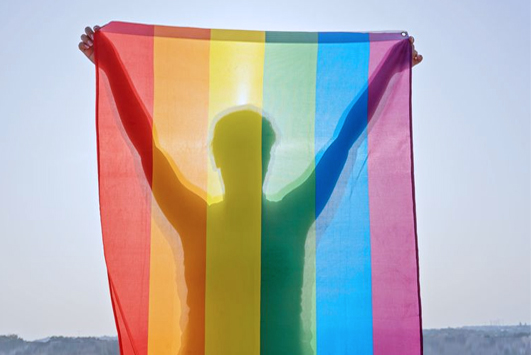Authors: Dr. phil. Ulli Biechele, Dipl.-Psych. Margret Göth, Dipl.-Psych. Thomas Heinrich, Psych. (M.Sc.) Luise Kenntner and Dipl.-Psych. Andrea Lang
“Already at school I fancied my sports teacher“
“The older men in the changing room have always fascinated me”
“On my first day of university I saw two lesbians kissing each other openly in public – this was a great welcome for me”
“I am happily married – at least I thought as much, until I fell madly in love with a man last year”
“I was thinking I should also have a boyfriend, but I never really felt those butterflies in my stomach”
“I always thought that I had to wear dresses until I realized how comfortable I felt in my brother’s clothes”
“I could never find the words to describe what I was feeling. I knew I wasn’t fully a woman, but also not fully a man – what am I then?
The term “coming out” refers to a variety of experiences lived by lesbian, gay, bisexual, trans, intersex and queer persons: awareness of one’s own feelings, opening up to others about one’s own sexual orientation and/or gender identity and identifying with an LGBTQI* community.
A difference is made between inner and outer coming out. While inner coming out encompasses all the beautiful and sometimes hard parts of discovering your own feelings, outer coming out refers to the outward expression and designation of one’s own feelings and way of life to other people. This also includes the possibility and choice to not always outwardly express one’s identity.
For many, coming out is a very exciting time with many ups and downs. Some people feel like they are in a second phase of puberty, experiencing heart palpitations and blushing when a person they fancy [CA(1] calls or suddenly appears at their door. Even after a while, when many questions become clearer and don’t seem to be such a big deal anymore, other questions around coming out will remain for a lifetime. With every new personal contact, every new friend, every new boss, you still have to ask yourself when and how do I show this side of my love and relationship or my gender identity.
Coming out represents a milestone in the development of an LGBTQI* person. Current research shows that the ability to perceive your own sexual orientation as something positive and to integrate it into your life plan benefits your wellbeing and mental health. Being able to talk to others about your sexuality also improves the possibility of receiving social support, which in turn is crucial for mental health and general wellbeing. Just like heterosexual or cis persons, LGBTQI* persons thrive when they are able to share their lives with friends and receive support from important people in their lives. Accordingly, it is not surprising that people who have to hide their sexuality also experience greater difficulties in terms of their mental and possibly physical wellbeing, when compared to people who can live openly.
Last updated: 12/10/2020 - 11:23


